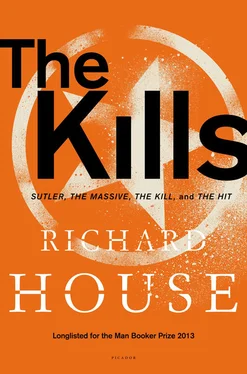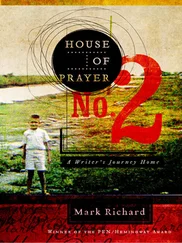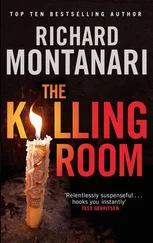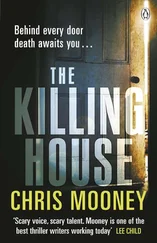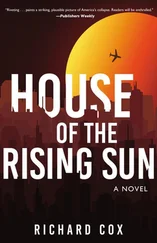While he waited for Howell, he began to wonder if the money was transferred. If Geezler was as good as his word. He opened the computer again, entered Finance, and checked the Accounts tab. He clicked on the junk account and the first screen appeared. 1 of 4. When he mistyped the site immediately shut down and the screen went blank.
Nervous now, he went to try again, but Howell returned.
‘Did you manage?’ Howell looked at the laptop screen. ‘What are you doing?’
‘I set the security level. I typed in a wrong number.’
‘How many times?’
‘Just the once.’
‘You only have three attempts before it locks you out.’ Howell straightened up. ‘They used to call these hostage accounts. They’re designed to be secure. If it locks you out you won’t have access. The transfer’s been made, so the money will show in the account soon. It’s supposed to be instant, but the connections aren’t as fast as we’d like — like everything else around here.’
Howell again excused himself and Ford shut the computer down, then folded the paper back into his pocket, aware that if he was going to leave the opportunity was right before him. Two hundred and fifty thousand dollars came close to the fee that Geezler had promised. Dollars not sterling, but close enough to be good enough. He began to sense a design behind Geezler’s call, a design which looked to his best interests.
With no sign of Howell returning, Ford turned to Kiprowski and noticed that the boy was sweating, looked ill-at-ease, unwell, his hand to his stomach. Every occupant of Camp Liberty succumbed at some point to flu-like symptoms, chills and shivers and night-sweats, a stomach that cramped and couldn’t hold water. Each one of them suffered skin irritations and nose bleeds. Ford blamed the fumes from the burn pits. The men blamed toxic agents, biochemical compounds. He told Kiprowski to sit down, but the boy signalled that he wanted to remain standing, he just needed a moment.
The boy’s anxiety increased his own. Still, Howell did not return. Would they arrest him now? Was this all some elaborate delay? Howell appeared to have no awareness of the impending arrest.
Kiprowski leaned back against the second safe and clutched a kitbag to his stomach, his face white and damp.
Ford hooked his backpack over his shoulder — there would be no better opportunity — and walked to the door. A corridor cut between the offices, at one end a wall, at the other an emergency exit. He thought to say something to Kiprowski, but found himself walking before he’d properly considered what to do, knowing that if he used the door an alarm would sound. The pressure of time, a desire to be out, gone from Southern-CIPA, away from smarmy Howell, the baby-sick stink of the offices, from Kiprowski’s sweating — everything compounded the fact that he was running out of time. Thirty minutes, less perhaps, now twenty-eight minutes: no time at all. Almost at the door, ready to push the bar, he turned to see Kiprowski running toward him full-pelt, arms beginning to rise to shield his head. And then chaos.
The blast came as a pulse, a punch that knocked Ford off his feet and battered him through the door, throwing him out so fast that he did not know what this was: inside and upright one moment, and in another rolled and shoved, flung pell-mell — the air about him a soup, a welter of heat, of collapsing walls, of plasterboard and ceiling tiles, of powdered glass. The atmosphere, even as it blackened, sparked about him.
He landed on his back, his boots stripped from his feet, his hands and face bloody, his ears raw with shrieks, his body numb, clothes ripped and pecked. With chaos descending he scrambled out of the smoke, deaf to the rapid crack of gunfire.
Listen. There’s a problem and it can’t be solved.
2.1
Ford came across the refugee camp in the late afternoon.
In pursuit of a lone mountain goat he stumbled to the peak of a steep embankment with a rock in each hand — breathless, sweaty, light-headed, and above all hungry. Directly under his feet the land swooped down to a city of grey-green tents curved to the crater’s smooth incline.
Startled by the view, he stopped at the edge. Two boys with rifles attended a loose herd of goats on the opposite slope. In the camp, bearded men congregated in front of their tents. Women scooped water from the edge of a cloud-bright lake. Black dogs ran feckless along the shore. Smoke rose in wayward strands. For two days he’d been certain he could smell food, and here in rising threads hung the tasty scents of braised meat and some kind of bread. All of this detail, tiny, toy-like, distinct, protected by a natural stone bowl.
He made a divot for himself in the shale at the crater’s crest and hunkered down to watch the camp. He couldn’t guess how many people the camp housed nor for how long the settlement had been established (the tracks between the tents could be weeks or years old). A dumpsite of barrels and plastic crates, an area set apart for fuel canisters, a separate corral with a water cistern and hand pumps, were evidence of organization, not longevity. After an hour watching armed men and half-wild dogs he decided to avoid the camp. If he came across strangers on the open road it would be another matter, but here in the mountain desert, two days from any village, he looked nothing but suspicious.
He’d slept in the afternoons to avoid the heat, and walked through the night in worn boots and slack clothes across a rising landscape of scree and scrub, a full moon cold on the rock. While he walked he fretted, conflating the bare facts of his flight with notions that did not make sense — so he lost himself to his discomfort, to the alternating heat and cold, to the certain fact of one footfall set before another. He told himself that he was in shock, although he knew this not to be true. In two or three days he would reach Kuzey and the Turkish border, but more immediately he needed water and he needed food.
Uncertain if he was nine or ten days away from Amrah City, he began to draw his route in the dirt. Day one, the flight from the southern desert, Amrah City to Baghdad. Day two, military transport to Balad Ruz, to be taken to a small field hospital where his hands and face were treated for burns and cuts, then back almost the entire way before curving up to Khanaqin and driving east toward Iran to see the faint spill of fire along the horizon. On day three, a free ride on a school bus with steel plates welded to its sides packed with Sorani Kurds shipping to Halabja for work. Then private transport the next morning, by-passing Sulaymaniyah, to Fort Suse with an American engineer — a sturdy man from Butte, Montana, convinced that the Iranians were poisoning their own people and that nothing could contain the toxins, because borders and frontiers, when you think about it, offer no real protection. Ford couldn’t disagree, the bandages on his hands and his wandering confirmed it. He managed ad hoc, day by day, progressing from this place to that with the rising doubt that he had made the journey unnecessarily complicated. From here, days four and five, he travelled by taxi to a military checkpoint, then on to Arbil, continuing his northern zigzag with a Jordanian driver who took pity and gave him names of other contacts: a man with a car to sell (although the car turned out to be a ’53 trail bike pilfered from an American contractor), and a man at Kuzey who could see him across the border. The days now became confused and Ford scratched out the route: days six and seven, or seven and eight, by motorbike, a painful ride along a dry riverbed toward Sarsil, toward Amedi, where he finally removed the bandages although his hands were still blistered and numb. From here he wasted two whole days heading west instead of north and lost the last of his food to rain. The same rain clogged the bike with mud which later hardened to stone, and forced him to walk through the scrub, complaining at his pure bad luck.
Читать дальше
